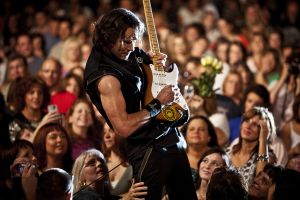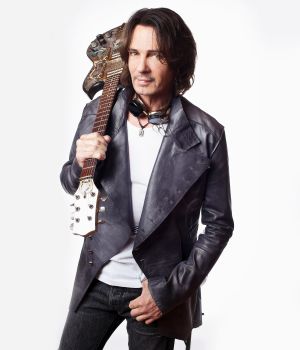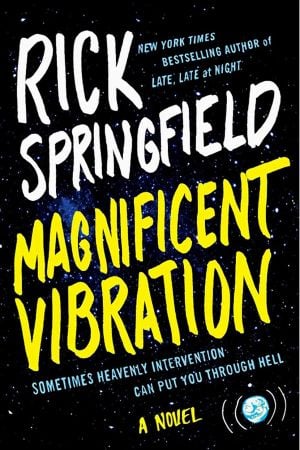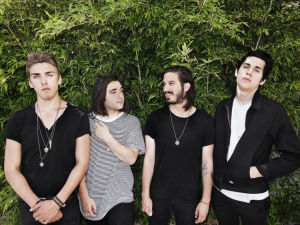St. Joe Live's interview with Rick Springfield



Rick Springfield has put on many hats throughout his illustrious career.
Of course, nearly everyone remembers his days as a pop star and a heartthrob in the early 1980s. During that run, he recorded “Jessie’s Girl,” which unquestionably became one of the biggest hits of the 1980s and still is widely beloved today. He followed that up with other radio rock heatseekers like “I’ve Done Everything For You,” “Don’t Talk to Strangers,” “Affair of the Heart,” “Human Touch” and “Love Somebody.”
At that time, he also was playing Dr. Noah Drake on the soap opera “General Hospital.” It’s just one of many acting roles he has taken over the decades. You might remember seeing him in the films “Hard to Hold” and “Legion.” In 1995, he joined the Broadway cast of the Tony-nominated musical “Smokey Joe’s Cafe.” These days, Springfield is making a pop culture resurgence on television, appearing in shows like “Californication,” “Hot in Cleveland,” “Hawaii Five-O” and “Family Guy.” And, naturally, he’s still a recurring guest star on “General Hospital.”
Despite all of this success, it’s his writing that has received the greatest critical acclaim. His 2010 autobiography, “Late, Late at Night: A Memoir” was included in Rolling Stone’s list of “The 25 Great Rock Memoirs of All Time.” Two months ago, Springfield released his first fictional novel, “Magnificent Vibration,” which has received rave reviews from Variety, several notable literary publications and authors like Mitch Albom, Peter Manseau and Jon Methven.
While juggling recording, acting and writing, Springfield has continued to tour. In fact, he’ll be coming to Kansas City for a co-headlining concert with fellow ‘80s stars Pat Benatar and Neil Giraldo at 7:30 p.m. July 16 at Starlight Theatre.
Springfield recently spoke with St. Joe Live about the Kansas City concert, the tour with Benatar, his new book and some other things on the horizon. Here’s what he had to say.
St. Joe Live: Your new book “Magnificent Vibration” came out a couple of months ago and it’s been getting really good reviews from Variety and Kirkus Reviews. It’s about a sex-obsessed video editor who’s going through a nasty divorce and finds God’s phone number in a stolen self-help book. I know this is a broad question, but why was this a story that you wanted to tell?
Rick Springfield: It just kind of wrote itself. It started out with what would happen if I had a line to God and it kind of went from there. I found out that God has a bit of an attitude and he’s pissed off about the way we’re handling the world — his beautiful planet.
Live: And how much of the book is biographical?
Springfield: Not at all, actually. Every character starts from a truthful moment with me or someone that I know. But, really, they take on their own life as the story progresses. But there’s no real biographical stuff. Like, my family was very different than Horatio’s family, and I actually haven’t spoken to God yet.
Live: Of course not (laughs). But I know that you’ve mentioned you stole some books when you were a kid. So, I thought that was a tie between you and the character.
Springfield: There are little things like that all through it. Like Ronan’s birth and death dates are my father’s birth and death dates. They’re things that fans might pick up on and enjoy seeing. But the only thing that really happened to me was when I was texting and almost drove my car into the back of someone else’s and I had to cut through a red light (laughs).
Live: Excluding your die-hard fans, I think a lot of people remember what you did with hits like “Jessie’s Girl” and “Love Somebody” and “Don’t Talk to Strangers” and they expect you to still be that guy in concert. But you rock a lot harder now. I mean, you were on Dave Grohl’s “Sound City” album. I think your songwriting has matured and become more nuanced, too. Because you have progressed so much, how do you feel about that nostalgic feeling that people have toward you?
Springfield: I think that makes up a lot of the audience — the nostalgia, the memories from the ‘80s. But we do a lot of new songs and they go over really great. My band is very thundering and my live shows have always been a lot louder and a lot more rock than people expect. I hear that a lot from the guys who come with their wives or their girlfriends. They’re like, ‘Wow. You can actually play guitar.’ If I don’t have some chops after 40 years of guitar playing, then I should hang it up.
Live: No kidding. I saw you in the “Sound City” concert in Austin last year when you were playing with the Foo Fighters. And I was thinking, ‘Wow, he can wail.’ It really did surprise me. Even though I knew you were a good guitar player, I guess I just didn’t know that you could rock that hard.
Springfield: Yeah. I think it’s coming from people’s first introduction to me — along with “Jessie’s Girl” — being a soap actor, which was really a side thing I was doing. I’ve been playing guitar since I was 14, and I was in successful bands in Australia just as a guitar player before I came here. I think the soap opera thing really tweaked people a bit. They couldn’t quite put the two together because I was an actor on a soap, which has a slightly cheesy element to it. That was a double-edged sword for sure. It really kicked (my career) into high gear, but it had a bit of a backlash.
Live: When you come to Kansas City, it’ll be a double bill with Pat Benatar and Neil Giraldo. How did the tour with these two come about, and what have you enjoyed most about playing these shows with Pat and Neil?
Springfield: We’re both great bands with a lot of great songs, and our show is super-high energy. We obviously get a bigger audience because it’s both bands together, so we’re both happy with that. Neil played the original guitar on “Jessie’s Girl,” so I’ve known them since the ‘80s. It just took 35 years to get a tour together (laughs).
Live: Because it’s a double-bill concert, is your set mostly relegated to the greatest hits or do you get to bust out any deep cuts or newer material?
Springfield: Yeah. We do new ones and a couple of the fan-favorite album cuts. I do a medley of a bunch of hits, which kind of takes care of a lot of that, so we can stretch out a bit. But it’s a lot of the hits. There’s really a bunch of songs I can’t leave the stage without playing (laughs), so I do those for sure. You know, when I go to see someone, I don’t want them to play their whole new album. I want to have a good time and hear the songs I love.
Live: True. I went to a Rush concert not too long ago, and the middle of their set was all new stuff. There were a lot of people who really weren’t into that.
Springfield: Everyone goes to the bathroom (laughs). ... There’s places for that, you know. We do a couple of the new songs from “Songs for the End of the World,” but they’re great songs, they’re high-energy and the audience is involved, so we don’t get a lot of bathroom breaks in our show.
Live: Good. Good to know. You were playing big concerts back in the 1980s and you’re still playing them today. Other than age, what are the biggest differences between your concerts then and your concerts now?
Springfield: They’re more fun now, actually. I’m more assured. I know what I’m doing. I don’t really feel like I have anything to prove. And I’m doing it because I love the audience connection. That’s really why I go out and play. It’s my only real connection with humanity because I’m pretty much a loner when I’m on my own. I get great joy from it. Through the ‘80s, it was very high pressure and there was a lot of stuff I had to deal with.
Live: And I’m sure you were worrying about how relevant you were at that time in the ‘80s, but now your music has stood the test of time. I’m sure it’s cool to see how it’s touching new generations.
Springfield: Yeah, it really is. You see these young kids in the audience singing the verses to “Jessie’s Girl,” which is pretty cool.
Live: You’ve noted in other interviews that rock really doesn’t get the kind of radio play that it used to and some pundits would venture to say that rock is dead or that it’s at least not what it was. That said, are there any young rock bands or up-and-coming rock acts that you like listening to — ones that give you hope for rock?
Springfield: There’s a lot of great bands out there. As far as radio is concerned, rock is pretty dormant at the moment, but it’s just the cycle. There are still stations that play it, but there are some great bands that tour. I love listening to new albums by some of the bands I like. Obviously, the Foo Fighters are still making great rock. Porcupine Tree — I like them, and Queens of the Stone Age whenever they put something new out. And I hear a lot of great songs from new bands that are really well-produced and they’re still killing it as far as I’m concerned. ... I’m a guitar guy, so I head for that direction generally.
Live: It seems like you’re always keeping yourself busy, whether it’s making music, writing books or acting. Do you have any projects on the horizon that you can tell me about?
Springfield: I’m working on a second book and there’s some acting stuff coming up that we haven’t finalized.
Live: Will it be on TV, Broadway or film?
Springfield: It’s a film thing, but it’s still kind of in the works, so I don’t talk about it because it jinxes it (laughs). And I’m going to Australia for the first time in my career as a solo artist. I played there, obviously, in tons of bands when I was a kid, but I’ve never toured there as a solo artist. I’m doing that in October, so that should be fun as well.
Live: You’ve won a Grammy, you’ve recorded huge hits, you’re in the Hollywood Walk of Fame now, you’ve been in TV shows, movies, plays, you’ve written books. Is there anything in your career that stands out as the thing you’re most proud of?
Springfield: I think I’m most proud of any success that my writing has had. All through my career, that’s really been the focus of what I’ve done. It’s been writing — either songwriting or, later, prose writing. But I started out wanting to be just a writer before music took over and I channeled that into songwriting. That’s the one thing I can do alone in a room by myself. (I don’t have to worry) about getting paid or someone liking it or not liking it, someone applauding or not applauding. I think, in the long run, it’s what’s fired my career and given it the longevity it has. I can write and I have control over that and I love to do that.
Live: And while your name certainly powers sales of the book, you’re actually getting really good reviews with the things you’ve written. That has to feel spectacular.
Springfield: Yeah, and they’re from literary mags that like to make fun of guys like me that think, ‘Hey, I’ve written a couple of pop songs. Here’s my first novel.’ They’ve been very responsive to the book. I’ve actually gotten better reviews for my book than I got for my albums (laughs).
Live: Is there anything else you’d like the readers in St. Joseph and Kansas City to know?
Springfield: Just that I love them dearly and we’ll be there to rock it.
Shea Conner can be reached at [email protected]. Follow him on Twitter: @stjoelivedotcom.
Similar Stories
Most Read
Related YouTube Video
Bad Suns is proof that rock music doesn't have to be all flash and hype. Just take some simple, catchy melodies and mix them with a jambalaya of influences and you've got something special.
With its hit "Cardiac Arrest" and debut album "Language & Perspective," the Los Angeles quartet are making a name for themselves, combining the catchy eclecticism of The 1975 lead by lead singer Christo Bowman's baritone vocals, which recalls groups like Bastille and Depeche Mode.
We spoke with Bowman on the road as the band prepares for its show at the Riot Room in Kansas City on July 7.
St. Joe Live: As far as "Cardiac Arrest" goes, do you remember the first time you heard that song on the radio?
Bowman: We submitted it to the local radio station in Los Angeles, KROQ, and when we found out they were going to play it, we were so surprised. We got in the car together to listen to it.
More specifically, the memory that sticks out to us is on our first tour in January, I think it was right after that Kansas City show, we had just finished up a show in Colorado and we were packing up the van outside and we were getting ready to go off to the next city. As we turned the van on, the song came on the radio like instantly. That was really crazy for us since we were in a different state. I remember that vividly.
SJL: That's awesome.
Bowman: Yeah, it was pretty cool.
SJL: Now, you've been writing songs for 10 years. Do you remember those first songs you wrote?
Bowman: Yeah.
SJL: Are they good feelings or negative feelings?
Bowman: It's all about progression. I think everyone starts somewhere. I remember those first songs that I wrote. It's pretty funny when I go back, it's so simple that I could pick up a guitar and play it like that. I think it's funny to go back and think about those songs when I was just a little kid and now, having this full album that's, really, a feeling of great accomplishment.
SJL: I read that you were into bands like blink-182 and stuff. Was it like pop-punk back then that you were writing?
Bowman: I wasn't so enamored with the genre as I was that band. It was what I had access to. I think, further than that, I got into bands like The Clash and The Cure, as opposed to pop-punk bands. I was never really into that. But, yeah, blink-182 was like every kid's first favorite band at that age, I think.
SJL: Do you know what initially inspired you to start writing and singing?
Bowman: I was inspired first to just pick up a guitar, I had seen music videos for the first time and I kind of realized how cool it was. I put it together that it was something I could do, even though I had only seen adults doing it at the time.
I got my first guitar and I thought I just wanted to play and then I couldn't play very well, but I could put chords together. So I started covering songs, playing songs I was familiar with and eventually writing songs. I like playing with melodies and something I became infatuated with, something I liked to put a lot of time into. I wouldn't say I thought about it too hard, I just started doing it.
SJL: What were some of the first songs you started covering?
Bowman: Oh man. I remember learning to play "High" by The Cure. I remembering covering that. That was the first song I learned to play playing with bar chords. I remember that being kind of tricky. That's the one cover that sticks out to me.
SJL: That's a good song to start out with.
Bowman: I remember one of the difficult guitar parts that I learned to play when I was like 10-years-old was "Under The Bridge" by Red Hot Chili Peppers.
SJL: I think for young musicians, that's a pretty big benchmark.
Bowman: And John Frusciante is still one of my favorite guitarists.
SJL: He's amazing.
Bowman: Oh yeah. He's definitely an influence.
SJL: Now, you released an EP before the album. How long were the songs (on the album) stewing around before you were to commit them to recording and this album?
Bowman: It was never that we had a bunch of songs sitting around. Maybe for a minute it was like that. Really, the songs were all just a progression.
The oldest song on the album, called "Transpose," which was the first song we wrote that tended to be kind of the Bad Suns song. That put us in a new direction musically. That song went through a couple of arrangements to where it's at now. Once we had that song, the idea of what we wanted to do with the music became a bit more clear. It's still something that even today we're still trying to process and constantly unravel a bit more. I think on the album there's a bit of diversity musically, but it also feels stylistically (similar).
I think most of those songs that are on the EP were written to be on the album. We kind of picked songs on the record that would fit on an EP as an introduction for people to get our music first.
SJL: So was there more writing in the studio?
Bowman: There was a bit. It wasn't something we were entirely comfortable with before. Most of the songs were, but two of the songs ("Learn to Trust" and "Rearview") were something we wrote in the studio. It was a very rapid-fire process.
SJL: One thing I keep reading is how the album is perfect summer music. It's sounds very confident, cohesive and natural.
Bowman: We wanted to play to our strengths. But at the same time, we were constantly pushing ourselves to improve.
SJL: You're throwing a lot of different genres out there. There's so much going on that it rewards listeners on multiple listens.
Bowman: We're fans of music in general, instead of being fans of one specific genre. There's a lot of room that we leave open.
SJL: Is this your first headlining tour?
Bowman: Yes it is. This is our first headlining tour, so we're excited about it. It's going to be a lot of fun.
SJL: What have you been learning as you've been out on the road?
Bowman: We went from being a band that spent most of its time in the recording studio and the rehearsal studio to now being a band that's going out on this giant summer tour. We're constantly improving and trying to improve the show and anything you can do to make the show better. It's a lot of stuff that takes time naturally.
